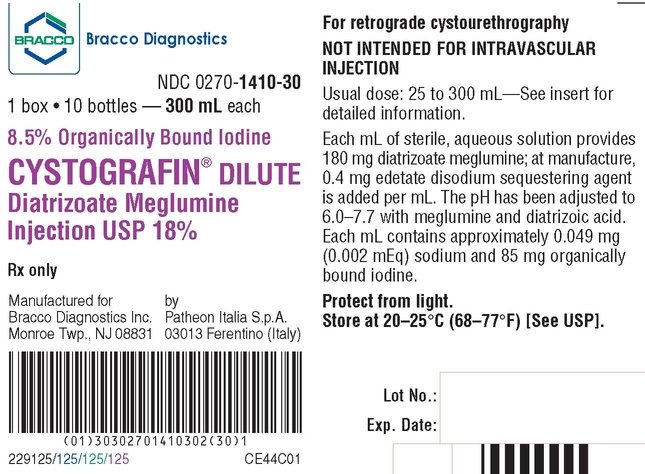Cystografin Dilute Prescribing Information
Package insert / product label
Generic name: diatrizoate meglumine
Dosage form: injection, solution
Drug class: Ionic iodinated contrast media
Medically reviewed by Drugs.com. Last updated on Mar 1, 2024.
On This Page
Cystografin Dilute Description
Cystografin Dilute (Diatrizoate Meglumine Injection USP 18%) is a radiopaque contrast agent supplied as a sterile, aqueous solution. Each mL provides 180 mg diatrizoate meglumine with 0.4 mg edetate disodium as a sequestering agent. Each mL of solution also contains approximately 85 mg organically bound iodine. At the time of manufacture, the air in the container is replaced by nitrogen.
Indications and Usage for Cystografin Dilute
Cystografin Dilute is indicated for retrograde cystourethrography.
Contraindications
This preparation is contraindicated in patients with a hypersensitivity to salts of diatrizoic acid.
Warnings
Severe sensitivity reactions are more likely to occur in patients with a personaI or family history of bronchial asthma, significant allergies, or previous reactions to contrast agents.
A history of sensitivity to iodine per se or to other contrast agents is not an absolute contraindication to the use of diatrizoate meglumine, but calls for extreme caution in administration.
Related/similar drugs
glucagon, Lexiscan, mannitol, arginine, Ceretec
Precautions
Safe and effective use of this preparation depends upon proper dosage, correct technique, adequate precautions, and readiness for emergencies.
Retrograde cystourethrography should be performed with caution in patients with a known active infectious process of the urinary tract.
Sterile technique should be employed in administration. During administration, care should be taken to avoid excessive pressure, rapid or acute distention of the bladder, and trauma.
Contrast agents may interfere with some chemical determinations made on urine specimens; therefore, urine should be collected before administration of the contrast medium or two or more days afterwards.
Pregnancy–Teratogenic Effects:
Animal reproduction studies have not been conducted with diatrizoate meglumine injection. It is also not known whether diatrizoate meglumine injection can cause fetal harm when administered to a pregnant woman or can affect reproduction capacity. Cystografin Dilute should be administered to a pregnant woman only if clearly needed.
Adverse Reactions/Side Effects
Retrograde genitourinary procedures may cause such complications as hematuria, perforation of the urethra or bladder, introduction of infection into the genitourinary tract, and oliguria or anuria.
If intravasation of this drug occurs, the reactions which may be associated with intravenous administration may possibly be encountered. Hypersensitivity or anaphylactoid reactions may occur. Severe reactions may be manifested by edema of the face and glottis, respiratory distress, convulsions or shock; such reactions may prove fatal unless promptly controlled by such emergency measures as maintenance of a clear airway and immediate use of oxygen and resuscitative drugs.
Endocrine: Thyroid function tests indicative of hypothyroidism or transient thyroid suppression have been uncommonly reported following iodinated contrast media administration to adult and pediatric patients, including infants. Some patients were treated for hypothyroidism.
Cystografin Dilute Dosage and Administration
Preparation of the patient: Appropriate preparation is desirable for optimal results. A laxative the night before the examination and a low residue diet the day before the procedure are recommended.
Dosage: The dose for retrograde use in cystography and voiding cystourethrography ranges from 25 to 300 mL depending on the age of the patient and the degree of bladder irritability; amounts greater than 300 mL may be used if the bladder capacity allows. Best results are obtained when the bladder is filled with the contrast agent.
Administration: After sterile catheterization, the bladder should be filled to capacity with Cystografin Dilute using a suitable sterile administration set. Care should be taken to avoid using excessive pressure. The presence of bladder discomfort or reflux and/or spontaneous voiding usually indicates that the bladder is full.
How is Cystografin Dilute supplied
Cystografin Dilute (Diatrizoate Meglumine Injection USP 18%) is available in packages of ten 300 mL bottIes (NDC 0270-1410-30).
| CYSTOGRAFIN DILUTE
diatrizoate meglumine injection, solution |
||||||||||||||||||||
|
||||||||||||||||||||
|
||||||||||||||||||||
|
||||||||||||||||||||
|
||||||||||||||||||||
|
||||||||||||||||||||
| Labeler - BRACCO DIAGNOSTICS INC (849234661) |
| Registrant - BRACCO DIAGNOSTICS INC (849234661) |
| Establishment | |||
| Name | Address | ID/FEI | Business Operations |
|---|---|---|---|
| PATHEON ITALIA SPA | 434078638 | ANALYSIS(0270-1410) , MANUFACTURE(0270-1410) | |
| Establishment | |||
| Name | Address | ID/FEI | Business Operations |
|---|---|---|---|
| Justesa Imagen, S.A.U | 477020325 | API MANUFACTURE(0270-1410) | |
More about diatrizoate
- Check interactions
- Compare alternatives
- Reviews (2)
- Side effects
- Dosage information
- During pregnancy
- Drug class: ionic iodinated contrast media
- Breastfeeding
Patient resources
Professional resources
Other brands
Gastrografin, MD-Gastroview, Cystografin, Hypaque, Renografin-60

